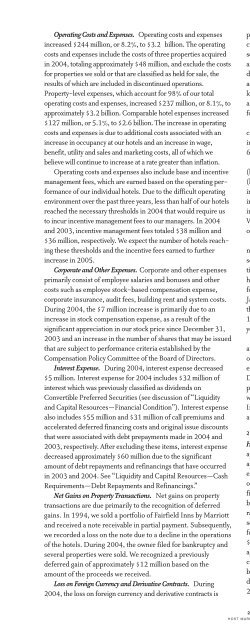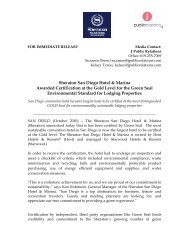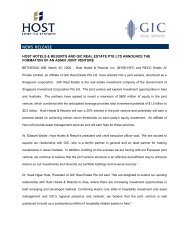Host Marriott 2004 Annual Report - Host Hotels & Resorts, Inc
Host Marriott 2004 Annual Report - Host Hotels & Resorts, Inc
Host Marriott 2004 Annual Report - Host Hotels & Resorts, Inc
You also want an ePaper? Increase the reach of your titles
YUMPU automatically turns print PDFs into web optimized ePapers that Google loves.
Operating Costs and Expenses. Operating costs and expenses<br />
increased $244 million, or 8.2%, to $3.2 billion. The operating<br />
costs and expenses include the costs of three properties acquired<br />
in <strong>2004</strong>, totaling approximately $48 million, and exclude the costs<br />
for properties we sold or that are classified as held for sale, the<br />
results of which are included in discontinued operations.<br />
Property-level expenses, which account for 98% of our total<br />
operating costs and expenses, increased $237 million, or 8.1%, to<br />
approximately $3.2 billion. Comparable hotel expenses increased<br />
$127 million, or 5.1%, to $2.6 billion. The increase in operating<br />
costs and expenses is due to additional costs associated with an<br />
increase in occupancy at our hotels and an increase in wage,<br />
benefit, utility and sales and marketing costs, all of which we<br />
believe will continue to increase at a rate greater than inflation.<br />
Operating costs and expenses also include base and incentive<br />
management fees, which are earned based on the operating performance<br />
of our individual hotels. Due to the difficult operating<br />
environment over the past three years, less than half of our hotels<br />
reached the necessary thresholds in <strong>2004</strong> that would require us<br />
to incur incentive management fees to our managers. In <strong>2004</strong><br />
and 2003, incentive management fees totaled $38 million and<br />
$36 million, respectively. We expect the number of hotels reaching<br />
these thresholds and the incentive fees earned to further<br />
increase in 2005.<br />
Corporate and Other Expenses. Corporate and other expenses<br />
primarily consist of employee salaries and bonuses and other<br />
costs such as employee stock-based compensation expense,<br />
corporate insurance, audit fees, building rent and system costs.<br />
During <strong>2004</strong>, the $7 million increase is primarily due to an<br />
increase in stock compensation expense, as a result of the<br />
significant appreciation in our stock price since December 31,<br />
2003 and an increase in the number of shares that may be issued<br />
that are subject to performance criteria established by the<br />
Compensation Policy Committee of the Board of Directors.<br />
Interest Expense. During <strong>2004</strong>, interest expense decreased<br />
$5 million. Interest expense for <strong>2004</strong> includes $32 million of<br />
interest which was previously classified as dividends on<br />
Convertible Preferred Securities (see discussion of “Liquidity<br />
and Capital Resources—Financial Condition”). Interest expense<br />
also includes $55 million and $31 million of call premiums and<br />
accelerated deferred financing costs and original issue discounts<br />
that were associated with debt prepayments made in <strong>2004</strong> and<br />
2003, respectively. After excluding these items, interest expense<br />
decreased approximately $60 million due to the significant<br />
amount of debt repayments and refinancings that have occurred<br />
in 2003 and <strong>2004</strong>. See “Liquidity and Capital Resources—Cash<br />
Requirements—Debt Repayments and Refinancings.”<br />
Net Gains on Property Transactions. Net gains on property<br />
transactions are due primarily to the recognition of deferred<br />
gains. In 1994, we sold a portfolio of Fairfield Inns by <strong>Marriott</strong><br />
and received a note receivable in partial payment. Subsequently,<br />
we recorded a loss on the note due to a decline in the operations<br />
of the hotels. During <strong>2004</strong>, the owner filed for bankruptcy and<br />
several properties were sold. We recognized a previously<br />
deferred gain of approximately $12 million based on the<br />
amount of the proceeds we received.<br />
Loss on Foreign Currency and Derivative Contracts. During<br />
<strong>2004</strong>, the loss on foreign currency and derivative contracts is<br />
primarily due to the approximate $7 million loss from the foreign<br />
currency exchange contracts related to mortgage debt that was<br />
secured by three of our Canadian hotels for the majority of <strong>2004</strong><br />
as the U.S. dollar continued to decline in relation to the Canadian<br />
dollar. These contracts were deemed ineffective for hedge<br />
accounting purposes in 2003, which resulted in an $18 million<br />
loss at that time. See “Liquidity and Capital Resources—Debt<br />
and Effect of Financial Covenants—Mortgage Debt Covenants”<br />
for further discussion.<br />
Minority Interest Expense. Minority interest expense<br />
consists of our minority partners’ share of the income or loss<br />
in consolidated hotel partnerships and the approximate<br />
6% ownership in <strong>Host</strong> LP.<br />
Equity in Earnings (Losses) of Affiliates. Equity in earnings<br />
(losses) of affiliates consists of our portion of the earnings<br />
(losses) of two partnerships in which we own non-controlling<br />
interests. The decrease in the loss can be attributed to a decrease<br />
in the net loss of CBM Joint Venture LLC in <strong>2004</strong> and an<br />
increase in the income from our investment in Tiburon Golf<br />
Ventures, L.P. See “Investments in Affiliates” for a discussion<br />
of these partnerships.<br />
Discontinued Operations. Discontinued operations consist of<br />
nine hotels sold in <strong>2004</strong>, eight hotels sold in 2003, one hotel<br />
sold in 2002, the gain on the disposition and business interruption<br />
proceeds for the New York <strong>Marriott</strong> World Trade Center<br />
hotel in 2003 and 2002 and four properties classified as held<br />
for sale as of December 31, <strong>2004</strong>, all of which were sold in<br />
January 2005. In accordance with SFAS 144 “Accounting for<br />
the Impairment or Disposal of Long-Lived Assets” or SFAS<br />
144, the results of operations for these properties in the current<br />
year and prior periods are reflected in discontinued operations.<br />
For <strong>2004</strong>, the nine hotels sold generated net proceeds of<br />
approximately $246 million with a net gain on disposition<br />
of approximately $52 million. Our revenues for the 21 properties<br />
sold in 2003 and <strong>2004</strong> or classified as held for sale at<br />
December 31, <strong>2004</strong> and the final disposition of insurance<br />
proceeds for the New York <strong>Marriott</strong> World Trade Center hotel<br />
were $133 million for <strong>2004</strong> and $442 million for 2003.<br />
<strong>Inc</strong>ome before taxes for the same periods was $12 million<br />
and $191 million, respectively.<br />
2003 COMPARED TO 2002<br />
Hotel Sales. Hotel sales declined $68 million, or 2.0%, to<br />
approximately $3.2 billion. Hotel sales for 2003 include<br />
approximately $10 million for one hotel acquired in 2003 and<br />
exclude sales for the properties we have sold in <strong>2004</strong> and 2003<br />
or classified as held for sale in <strong>2004</strong>, which have been reclassified<br />
to discontinued operations. See “Discontinued Operations”<br />
below. We discuss operating results for our hotels on a comparable<br />
basis, and as of December 31, 2003, 112 of our 117 fullservice<br />
hotels owned on that date were classified as comparable<br />
for 2003 and 2002. For 2003, our comparable hotel RevPAR of<br />
$96.85 was down 4.2% from 2002, reflecting a decline in average<br />
room rate of 1.9% and a decrease in occupancy of 1.6 percentage<br />
points, primarily due to reduced transient demand for<br />
both business and leisure travel. Beginning in the fourth quarter,<br />
demand began to improve relative to the first three quarters of<br />
2003, with less than one-half a percent decrease in room rate<br />
22<br />
HOST MARRIOTT <strong>2004</strong>








